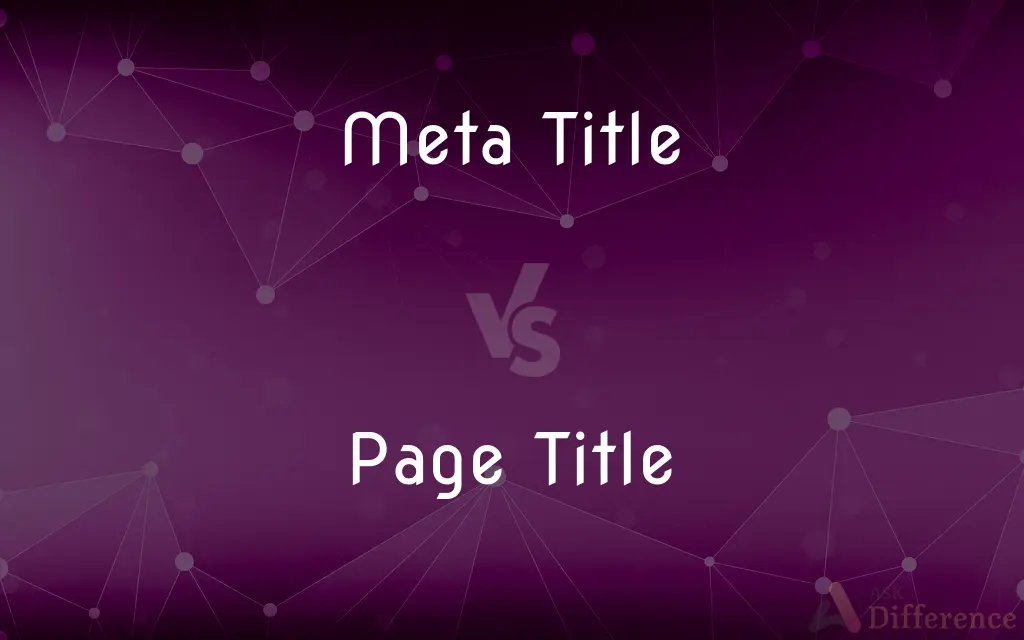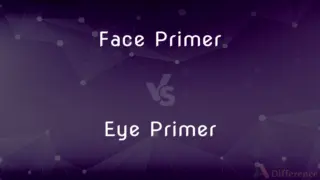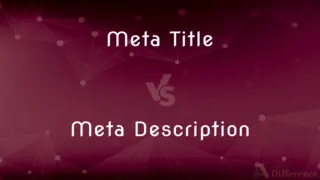Meta Title vs. Page Title — What's the Difference?
Edited by Tayyaba Rehman — By Fiza Rafique — Published on November 8, 2023
Meta Title is an HTML element defining webpage title for search engines; Page Title refers to the visible title displayed on the webpage itself.

Difference Between Meta Title and Page Title
Table of Contents
ADVERTISEMENT
Key Differences
Meta Title refers to the HTML element that specifies the title of a web page in search engine results and browser tabs. Contrarily, the Page Title often refers to the heading displayed on the webpage itself, which can be visually seen by the user and may not be identical to the Meta Title.
A Meta Title, hidden within a webpage’s code, provides search engines with a concise description of the webpage’s content. In contrast, a Page Title serves to label and provide a clear, often more elaborate or stylized, heading to a webpage when users visit it, sometimes adhering more to aesthetic or topical framing than SEO practices.
Search engine algorithms use the Meta Title as a key factor in understanding the content and context of a page, influencing how it's indexed. Whereas, a Page Title, being a visible element, primarily functions to inform and guide visitors once they are on the page, aiding in enhancing user experience and engagement.
While the Meta Title is primarily crafted with SEO best practices in mind, prioritizing keywords and succinct clarity to appeal to search engine algorithms, a Page Title might prioritize user understanding and contextual framing, potentially utilizing more conversational or topic-specific language.
Web developers and SEO experts generally optimize the Meta Title for search engine rankings, ensuring that it adheres to character limits and effectively encapsulates targeted keywords. Page Titles, however, might be developed with a more user-centric approach, ensuring that it is engaging and provides clear insight into the page’s content to the visitor.
ADVERTISEMENT
Comparison Chart
Visibility
Not visible on page, seen in search results
Visible on the webpage itself
Primary Purpose
SEO and search engine understanding
User understanding and experience
Character Limit
Typically up to 60 characters
No strict limit, but subject to webpage design
Presence in HTML
Found in the head section of HTML code
Displayed within the body content of HTML code
Target Audience
Primarily search engines, secondarily users
Primarily users, secondarily search engines
Compare with Definitions
Meta Title
Is not typically visible on the webpage itself.
Users cannot see the Meta Title while browsing the webpage.
Page Title
A visible title or heading displayed on a webpage.
The Page Title boldly declared the topic of the article.
Meta Title
Is crucial in defining webpage content for search engines.
An accurate Meta Title enhances the website’s search engine visibility.
Page Title
Does not have a stringent character limit.
The Page Title was lengthy, providing a thorough overview of the page's content.
Meta Title
Often adheres to a character limit for optimization.
The SEO expert ensured the Meta Title was under 60 characters.
Page Title
May not always align with the optimized Meta Title.
The Page Title was more elaborate and conversational than the Meta Title.
Meta Title
It appears in search engine results and browser tabs.
A well-written Meta Title helps in improving click-through rates.
Page Title
Can be stylized and presented according to design preferences.
The designer adjusted the Page Title's font and color for better aesthetics.
Meta Title
An HTML element influencing SEO and search rankings.
The Meta Title was carefully crafted with relevant keywords.
Page Title
Influences user understanding and experience on a page.
A clear Page Title ensures visitors understand the webpage's context.
Common Curiosities
What is a Page Title?
A Page Title refers to the visible heading or title displayed on a webpage, visible to users and providing context to the content.
Can Meta Title and Page Title be different?
Yes, Meta Title and Page Title can be different to cater to search engine optimization and user experience respectively.
Where is the Page Title displayed?
The Page Title is displayed on the webpage itself, often as a heading at the top of the content.
Where is the Meta Title located in HTML code?
The Meta Title is located within the section of a webpage’s HTML code.
What is a Meta Title?
A Meta Title is an HTML element that determines the title of a webpage for search engines and is displayed in search results and browser tabs.
What character limit is advisable for a Meta Title?
Generally, it's advised to keep Meta Titles under 60 characters to ensure they display well in search results.
Do Page Titles impact SEO?
While Page Titles may have a subtler impact on SEO compared to Meta Titles, they can influence user engagement and on-page SEO.
Why is the Meta Title important for SEO?
The Meta Title is pivotal for SEO as it helps search engines understand and index the page, impacting its ranking and visibility in search results.
Does Meta Title appear in search engine results?
Yes, Meta Title appears as the clickable title of a webpage in search engine results.
Can the Page Title be stylized?
Yes, the Page Title can be stylized according to webpage design, using various fonts, colors, and sizes.
How is the Page Title typically used in content?
The Page Title is often used to provide clear, direct context and understanding of the page's content for visitors.
Is the Page Title visible to search engines?
Yes, search engines can crawl and perceive Page Titles, although they weigh Meta Titles more heavily in terms of SEO.
Should keywords be included in the Meta Title?
Yes, including relevant keywords in the Meta Title can significantly enhance SEO and search engine visibility.
Is it mandatory to have both a Meta Title and Page Title?
While not strictly mandatory, having both is highly recommended to optimize for both search engine visibility and user experience.
How do Meta Titles appear to users?
Users can see Meta Titles in search engine results, browser tabs, and when sharing the page on social platforms.
Share Your Discovery

Previous Comparison
Face Primer vs. Eye Primer
Next Comparison
Meta Title vs. Meta DescriptionAuthor Spotlight
Written by
Fiza RafiqueFiza Rafique is a skilled content writer at AskDifference.com, where she meticulously refines and enhances written pieces. Drawing from her vast editorial expertise, Fiza ensures clarity, accuracy, and precision in every article. Passionate about language, she continually seeks to elevate the quality of content for readers worldwide.
Edited by
Tayyaba RehmanTayyaba Rehman is a distinguished writer, currently serving as a primary contributor to askdifference.com. As a researcher in semantics and etymology, Tayyaba's passion for the complexity of languages and their distinctions has found a perfect home on the platform. Tayyaba delves into the intricacies of language, distinguishing between commonly confused words and phrases, thereby providing clarity for readers worldwide.












































